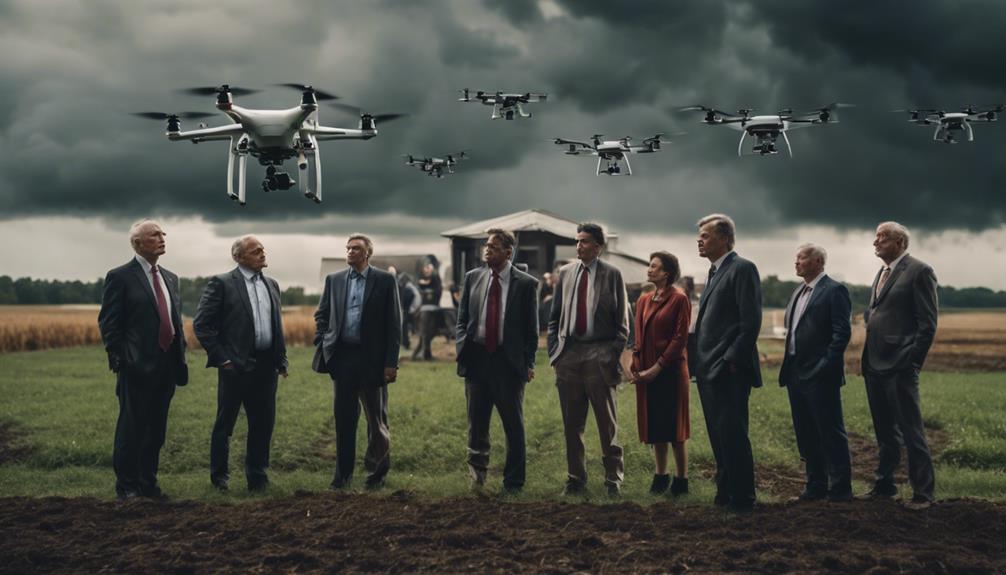
The recent bipartisan concerns raised by U.S. senators regarding the effectiveness of the USDA's monitoring of foreign-owned farmland underscore a growing unease about the influence and intentions of overseas investors within America's agricultural sectors. This initiative, pressing for stricter oversight and comprehensive reform of tracking systems, aims to address potential vulnerabilities in national security and the preservation of domestic agricultural interests. As the debate intensifies, one must consider the ramifications of such foreign investments. Are these merely economic ventures, or do they pose a more complex threat to the United States' agricultural sovereignty and security infrastructure? This pressing issue invites further scrutiny into the mechanisms that safeguard America's farmland.
Rally Crowds and Political Impact

The size of crowds at political rallies, often perceived as a measure of public support, can be a misleading indicator of electoral success. Large gatherings at these events might ignite a sense of unity and shared purpose among attendees, reinforcing their allegiance to a cause or candidate. This communal experience can be empowering, fostering a deep sense of connection and belonging.
However, it is crucial for supporters to recognize that while these assemblies reflect enthusiasm, they do not necessarily predict the final vote count. The true measure of support is more accurately gauged through sustained, diverse voter engagement across the entire electorate, rather than the number of participants at any single event.
Bipartisan Concerns on Farmland Ownership
Amid growing bipartisan concern, 14 U.S. senators have voiced serious apprehensions regarding the accuracy of the USDA's tracking of foreign-owned farmland. This united stance reflects a shared commitment across party lines to safeguard our nation's agricultural assets.
The senators' collective demand for greater transparency and accuracy in monitoring underscores a deep-seated belief in protecting not just the land but also the communal values and security inherent to our country's wellbeing. Their concerns resonate with a broad spectrum of Americans who see the land as a critical component of national heritage and sovereignty.
This issue transcends political divides, fostering a sense of unity and common purpose among stakeholders and citizens alike, emphasizing the integral role of agriculture in sustaining our nation.
Issues With AFIDA Compliance

Several issues plague the compliance with the Agricultural Foreign Investment Disclosure Act (AFIDA), notably the manual process of filing and collecting disclosures that is prone to errors and inaccuracies.
This outdated method not only hampers the accuracy but also diminishes the trust communities place in the system's ability to safeguard national interests. The manual handling of such sensitive data exposes it to various risks including misidentification of ownership stakes, which can have broader implications for community and national security.
The effectiveness of AFIDA is crucial for maintaining transparency and ensuring that all members of the community can feel secure about the integrity of land ownership information. Hence, improving compliance mechanisms is essential for upholding communal and national safety.
Funding Gaps in USDA Modernization
Addressing the modernization needs of the USDA, funding gaps significantly hinder efforts to improve the accuracy and efficiency of the Agricultural Foreign Investment Disclosure Act (AFIDA) compliance systems.
The current manual processes for filing and collecting disclosures are not only outdated but also prone to errors, undermining the credibility of the data crucial for monitoring foreign ownership of U.S. farmland.
Despite the clear need, the USDA has received insufficient funding to implement the mandated electronic submission process, which would streamline data entry and enhance accuracy.
This lack of financial support affects our ability to maintain a robust agricultural sector that feels secure and included in safeguarding national interests from potential exploitation through foreign investments.
National Security and Land Sales

The growing trend of foreign investment in U.S. agricultural land has raised significant national security concerns. As members of this nation, it is crucial that we recognize and address the potential risks associated with such investments.
Concerns have been amplified by instances where foreign entities have purchased land close to military bases, risking our collective security. The bipartisan group of senators who have voiced these concerns reflects a united front in safeguarding our homeland.
It is essential that we, as a community, support efforts to enhance transparency and scrutiny in these transactions. This will ensure that our agricultural foundations remain secure and firmly under control that aligns with our national interests and safety standards.
Conclusion
In conclusion, the bipartisan concerns raised by U.S. senators regarding the monitoring of foreign-owned farmland underscore the necessity for enhanced transparency and regulatory compliance.
Addressing issues within the AFIDA system and resolving funding shortages for USDA modernization are crucial steps to ensure the protection of national agricultural assets.
These measures will fortify the integrity and security of U.S. farmland, thereby preserving the nation's agricultural heritage and safeguarding its sovereignty against external influences.






